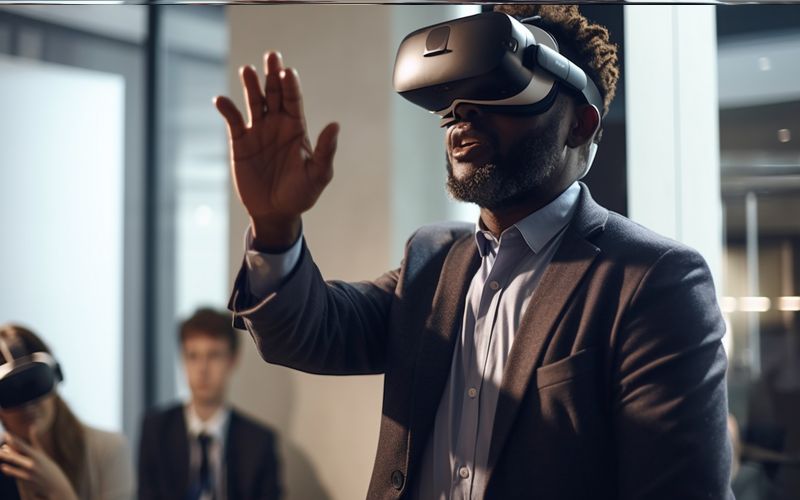Ever wonder what the future of business might look like? Well, get ready, because the Metaverse is coming and it’s about to transform industries as we know them. In the next few years, companies in every sector are going to start building out their digital twins in immersive virtual worlds. Before you know it, you’ll be able to pop on a virtual reality headset and meet with colleagues from around the globe, attend a keynote speech by your favourite thought leader, or close a business deal, all without leaving your living room.
The Metaverse is this futuristic idea of a virtual shared space accessible via the internet. In this digital realm, people can interact with others, conduct business, play games, and more. And while it may sound like something out of a sci-fi novel, the Metaverse is coming to life right before our eyes thanks to advances in virtual and augmented reality, blockchain, and digital assets like cryptocurrencies and NFTs. The companies that embrace these emerging technologies now will be poised to thrive in the Metaverse and shape the future of their industries. The future is virtual – are you ready?
The Fundamentals: Defining the Metaverse and Its Key Components

The metaverse is a collective virtual shared space, created by the convergence of virtually enhanced physical and digital reality. It incorporates concepts like virtual reality, augmented reality and video where users can interact with each other and virtual objects while operating virtual representations of themselves, known as avatars.
To understand the metaverse, you need to understand some of its key building blocks:
- Blockchain: A decentralised and distributed digital ledger that records transactions across many computers without the need for a central authority. It enables the secure transfer of data and digital assets.
- Cryptocurrencies: Digital currencies like Bitcoin that enable direct peer-to-peer transactions without the need for a central authority. They will facilitate commerce in the metaverse.
- Extended reality (XR): An umbrella term that covers virtual reality (VR), augmented reality (AR), and mixed reality (MR). These technologies merge the physical and digital worlds, allowing you to immerse yourself in virtual experiences.
- Web3: A decentralised version of the internet built on public blockchains, enabling users to own their data and digital assets. It will power the open metaverse infrastructure.
- Non-fungible tokens (NFTs): Unique digital assets with blockchain-based ownership. NFTs can represent collectible items, gaming assets, and virtual real estate in the metaverse.
The metaverse won’t be built by any single company. An open and interoperable network of virtual worlds is needed, built on web3 and blockchain technologies. Exciting times are ahead – the possibilities for connection, collaboration and commerce in an immersive internet are endless!
Real-World Applications: How Industries Are Adopting the Metaverse

The metaverse is transforming industries in exciting ways. Real-world applications are emerging across sectors, allowing companies to boost productivity, reach new audiences, and enhance experiences.
1. Retail and eCommerce
In retail, virtual stores and showrooms are popping up. Customers can browse digital aisles, see products from all angles, and even “try on” clothes. eCommerce brands are selling virtual goods like digital clothing and accessories. Some see virtual shopping as a pathway to increased real-world sales.
2. Entertainment
Concerts, movies, and theme parks are coming to the metaverse. Artists are holding virtual shows where fans can see their avatars perform. Filmmakers are creating immersive experiences. And companies are building virtual amusement and adventure parks. The entertainment options in the metaverse seem endless.
3. Education
Educators are using virtual and augmented reality to bring subjects to life in powerful ways. Students can explore historical sites, dive into cells, or manipulate geometric shapes. Immersive learning is proving highly engaging and effective. The metaverse enables personalised, self-paced learning accessible anywhere.
4. Healthcare
Doctors are leveraging extended reality for surgical training, virtual diagnostics, and telehealth. Patients can get virtual counselling and physical therapy. The healthcare applications of the metaverse show promise for improving outcomes, lowering costs, and reaching underserved communities.
The metaverse offers an exciting new frontier for businesses. Keep your eyes open—you’re sure to spot metaverse-powered innovations transforming industries in the coming years. The future is virtual, and it’s arriving now.
The Metaverse in Action: Immersive Experiences Reshaping Business

The Metaverse is enabling new ways for companies to connect with customers through immersive experiences. As extended reality technologies like virtual and augmented reality become more advanced, businesses are using them to transform how people shop, learn, work, and socialise.
1. Retail Therapy Reimagined
In the Metaverse, shopping is an adventure. Using virtual reality headsets, customers can browse digital stores stocked with virtual goods. They can pick up and examine 3D product models with their hands, and even try on clothing to see how items fit their avatar. Some companies are already experimenting with virtual stores where people shop for real products they have shipped to their homes.
2. Lifelike Learning
Education in the Metaverse is highly experiential. Instead of reading about historical events, students can be transported back in time. They can walk around virtual museums, explore recreated landscapes, or experiment with simulations. These immersive learning experiences are more engaging and help students develop a deeper, more intuitive understanding of subjects.
3. Next-Level Networking
Networking events in the Metaverse connect people from all over the world. Using avatars in a shared virtual space, attendees can mingle, make new contacts, exchange digital business cards, and have meaningful conversations. The Metaverse enables collaboration and relationship building on a global scale.
The future is virtual, and companies should start exploring how the Metaverse and immersive technologies can transform experiences, connect with customers in new ways, and gain a competitive advantage. The possibilities for innovation are endless in this new frontier of human and business interactions.
Conclusion
The virtual worlds are open, the opportunities are endless. Industries are being reshaped before our eyes, and you have a front-row seat to the action. Whether you want to invest in digital real estate, build a business in the Metaverse, create NFTs, or just experience what the fuss is all about, the future is here – and it’s yours for the taking. So put on your VR headset, pick an avatar, and dive in. The Metaverse is open for business, and there’s no telling how far it can take you. The only limit is your imagination. If you’d like to build up on your skills and knowledge to join the Metaverse revolution, sign up for our ‘Metaverse for Professionals’ course now!

